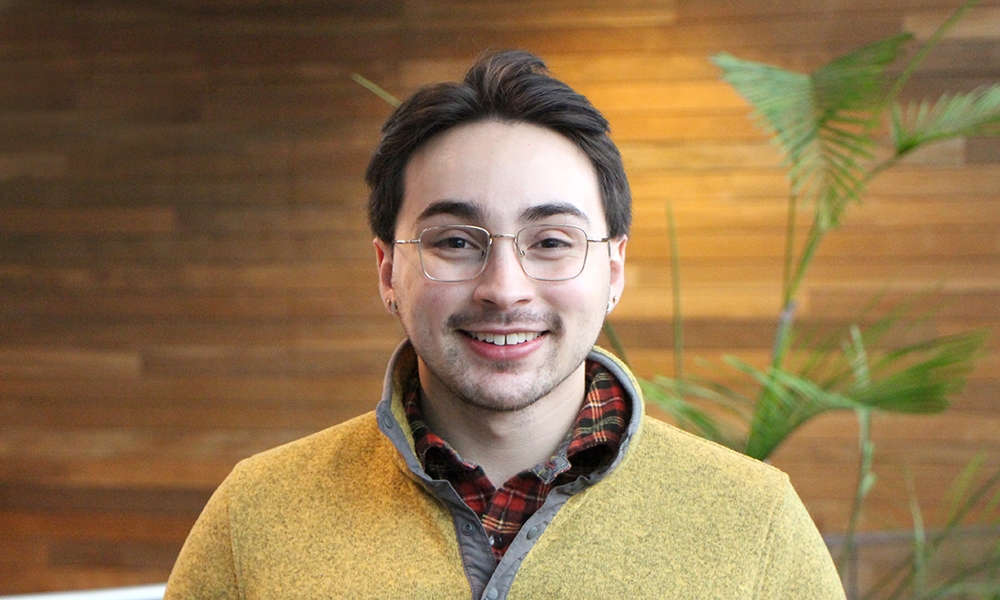MCO graduate student Alan Baez Vazquez is investigating how immune cells called macrophages contribute to repair of damaged lung tissue in Ruth Franklin’s lab. Franklin is an Assistant Professor in the Department of Stem Cell and Regenerative and an Affiliate of the Department of Immunology.
Baez Vazquez recently received an F31 Ruth L. Kirchstein National Research Service Award Individual Predoctoral Fellowship from the National Heart, Lung, and Blood Institute (NHLBI) in support of this research.
“One of the biggest challenges for us as a new lab is that we do not have a training record yet.,” Baez Vazquez says. “We’re not widely known yet, so it’s the NIH taking a chance on a new lab, hearing our proposal out, and then finding it interesting and worth funding.” He adds that proposal co-sponsor and Franklin Lab collaborator Carla Kim of Boston Children’s Hospital was instrumental in receiving the grant.
Baez Vazquez’s project will delve into how macrophages coordinate tissue repair following viral damage to the lung. “We have preliminary data showing that lung macrophages are important for promoting proper repair using genetic mouse models and ex vivo organoids–but–we’ve yet to find a mechanism behind our phenotype”. To uncover such mechanisms, they’re taking an unbiased approach and turning to conventional approaches (like single-cell RNA sequencing) and cutting-edge spatially-resolved transcriptomic technologies (like Slide-Seq, developed by their collaborators in Fei Chen’s lab at the Broad institute). ” We are interested in defining the macrophage-derived factors that give lung tissue the signal to repair itself. These could be cell-cell interactions (of myriad natures) and/or be spatially confined. Our favorite hypothesis is that macrophages secrete epithelial growth factors to promote epithelial regeneration.”
“Alan is bold in his approach to science and is willing to take risks,” says his advisor, Ruth Franklin. “He is also extremely collaborative, which has made this interdisciplinary project possible. Together with collaborators and other members of the lab, Alan has collected intriguing preliminary data and I’m excited to see where the science takes us!”
Born in Tlaquepaque, Jalisco, Mexico, Baez Vazquez was introduced to science through his mother, who worked in pharmaceuticals and vaccine development for livestock. When he was eight years old, his mother got a new job in Maine. The family moved, even though Baez Vazquez, his father, and his sister didn’t speak English. However, Baez Vazquez soon fell in love with Maine’s unique blend of rustic charm, coastal tranquility, and outdoor adventures.
He began his undergraduate education at University of Maine at Orono as a chemical engineering major but quickly realized that chemical engineering wasn’t his cup of tea. In his freshman year, Baez Vazquez took an introductory honors college course in the liberal arts that was taught by virologist Sally Molloy, and interacting with her made him curious to take more biology courses. Later in his undergraduate career, he conducted research on triclosan, an antibacterial agent that used to be widely used in consumer products like soaps and toothpastes, under the guidance of toxicologist Julie Gosse. Because of findings about its detrimental health effects, triclosan has since been banned by the FDA.
Baez Vazquez spent two summers conducting research at Jackson Laboratory in Bar Harbor, Maine. “That was my first introduction to immune cells and macrophages, and more heavy-duty immunology concepts,” he says. “I was working on whether or not there are mouse strain-based genetic differences that underlie immune cell heterogeneity in complex metabolic disease-related phenotypes such as the chronic inflammation associated with a high fat diet.” Studying inflammation provided his first introduction to key immunology techniques, such as single cell RNA-sequencing and flow cytometry.
Baez Vazquez went on to join the MCO program as part of the 2020 cohort. At that time, many courses and activities were still virtual, but Baez Vazquez says the experience created a tight-knit and supportive graduate student cohort. He adds that Graduate Program Administrator Lindsay Guest has been a vital resource for navigating grad school.
Hiking has remained an important part of Baez Vazquez’s life. He says that he and his friends have summited every peak in Acadia National Park. When he’s not in the lab or enjoying the outdoors, he plays video games and watches TV. “Right now, I’m really into The Bear…I find it really fascinating, because even though it’s about the culinary world–the really artsy and high-end culinary world–and what the system is like and how it chews people up and spits them back out, I find is very similar to academia,” he says. “A good parallel that I’ve been able to draw is that in both settings, you really need a good mentor.”
He adds that Franklin has been an excellent and patient mentor. “I just really want to thank all the mentors along the way–Dr. Sally Molloy at UMaine for introducing me to the field of biology as a whole; and then my undergraduate research mentor Dr. Julie Gosse for giving me the skills and credentials needed to end up at Harvard; and my mentors at Jax,” he says. “I was in the Rosenthal group working with Drs. Dan Skelly and John Graham. If I didn’t have that exposure from my summers with them, I don’t know if I would have been brave enough to dive into a field like immunology.”
Congratulations to Alan Baez Vazquez on receiving the F31 fellowship!




